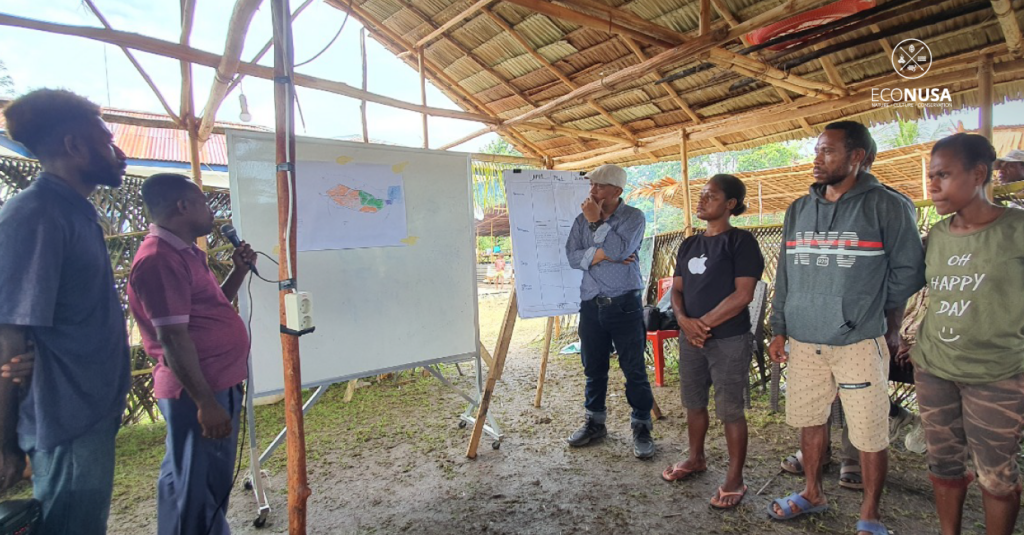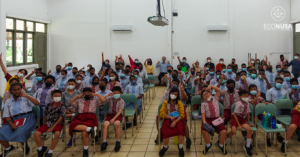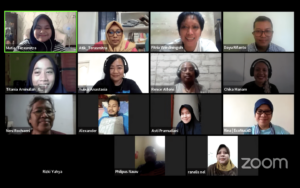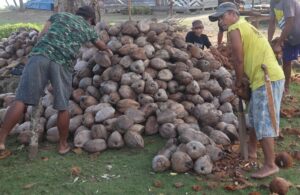
“Not just knowing how to eat, but also how to plant too”. The statement addressed by women working in the public kitchen which served the Social Transformation School (STS) in Mogatemin, South Sorong Regency, when they ate papeda (traditional porridge made from sago) seemed to be jokingly said. However, this utterance passed judgment to Dorina Tigori and other STS participants from sago cultivation class.
Dorina has ever planted sago, but she never succeeded despite her several trials. She had applied the common planting method used by the elders in her village in Mogatemin. The Head of Mogatemin Village, Eduard Tigori, who mentored the group of sago cultivation class also admitted the similar issue.
“I have ever planted sago seeds several times in the village, but all never grown. That makes me curious to know and this leads me to join the class here,” said Eduard.
Eduard admitted that after participating in the learning process with field practices, he got new knowledge and was anxious to practice his knowledge promptly.
Read also: Social Transformation School Officially Opened by South Sorong Regent
Unlike Dorina and Eduard, the other STS participants, Borina Kemesrar from Woloin Village and Mesak Woloble from Haha Village, were interested in the use of sago waste as the materials for sago mushroom production. It is reasonable noting the fact that both Woloin and Haha are known with large areas of sago village. Sago waste in these villages were just left unprocessed. “We come to know that the sago waste could be re-processed to produce sago mushroom,” said Mesak.
“Thank you, Mr. Instructor, for transferring remarkable knowledge to us. We will go back to our village and practice our knowledge. I have a plan to create sago mushroom soon I am back home,” said Borina.
On the other hand, Herman Tubur, a researcher and lecturer of Papua University who have extensive experiences on sago cultivation, appreciated the participants. They had serious and enthusiastic attention to the given theories and practices.
“I give more specific materials on sago forest management owned by the community. I do not simply provide my own knowledge, but I also learn a lot from the participants on how to manage sago forest management,” said Herman.
Read also: STS Participants Questioning Forest Status to South Sorong FMU
In addition to observing the pattern of sago development on each of the existing cluster, on the sago learning class we also study together on the seeding process of sago with raft and pond methods. Both methods here are related to sago forest management. In the class here, there was also simulation of sago seeding process.
“The process of sago planting is the most crucial part in sago forest management for its sustainability. We also learn together to construct a simple sago drying dome to produce sago powder. Then, from sago powder will be made into sago-made meatball with shrimp as the derivative product and the village has shrimp as the local potential,” said Herman who is also the Dean III of the Papua University’s School of Agriculture.
Herman expected what has been learned and practiced together could be transferred to other people in their villages. All STS participants came from the villages with sago.
Read also: Junior High School Graduates Trains Locals on Organic Fertilizer and Grafting
“I thank also to EcoNusa that initiated this great program. I hope the program could connect some disciplines of knowledge so the indigenous people and Papuan people in these villages could optimize their existing potentials to give economic impact to them,” he added.
STS in Mogatemin village was the 6th STS held by EcoNusa. The activity on 26-31 March 2022 was attended by 38 participants from 14 villages in South Sorong.
Editor: Nur Alfiyah, Leo Wahyudi, Lutfy Putra




